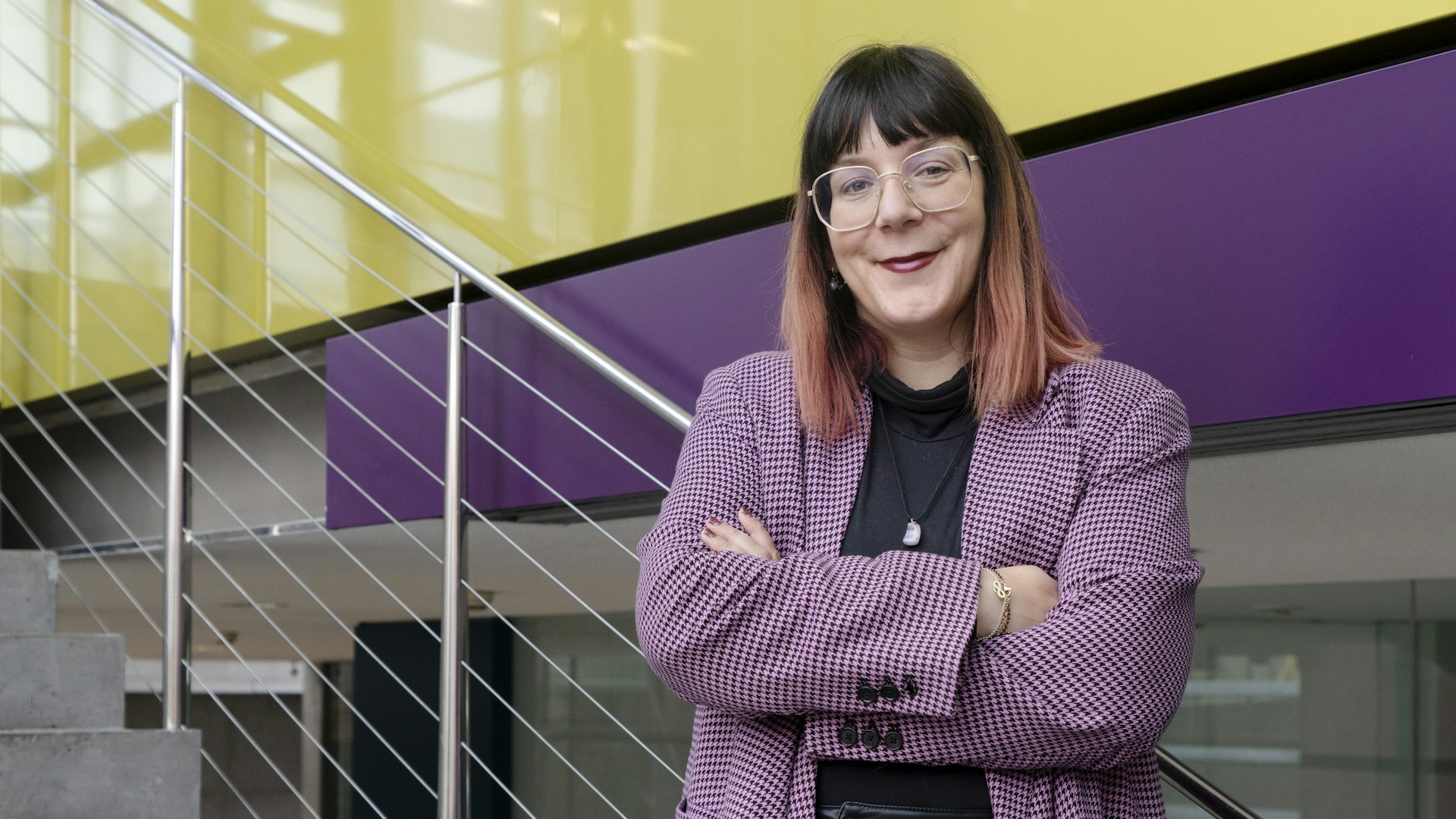magazine_ Interview
Achieving better health through participation
Political and health scientist and Katharina Crepaz studied the influence of social participation on health. Her thesis on scientific qualification for teaching received an award from the Technical University of Munich.
What does minority politics have to do with health? A lot it seems, as emerges in our conversation with researcher Katharina Crepaz whose academic work focuses primarily on diversity, European politics, and autonomy. Whilst obtaining her habilitation at the Faculty of Sport and Health Sciences at the Technical University of Munich, Crepaz transitioned to studying the social determinants or impacts of living environments, age, gender and migration on health.
Eurac Research: As a political scientist, what brought you to health care?
Katharina Crepaz: It isn’t an unusual combination. The World Health Organization (WHO) defines health not only as the absence of disease, but also as physical, social, and mental well-being in a broader sense. If people are not able to participate, if they are not empowered to have a voice, the social component of health takes a back seat and, consequently, so does physical and mental health. I worked in two places in Munich: The Max Planck Institute for Social Law and Social Policy and Munich’s Technical University, at the Chair of Sociology of Diversity. In both institutes, I focused on how to deal with diversity in our society. The influence that political and social participation have on health was the central question of my habilitation thesis.
And what answers did you find?
Crepaz: Everything is about representation and participation. In Germany, people with disabilities for whom guardianship has been arranged have long been excluded from the right to vote. In this way they have been denied the most basic form of political participation. Italy is different, the road to greater inclusion had already been mapped out with the great reform bloc of the 1970s. In particular, the inclusive school system, which today is considered a progressive model throughout Europe. People with migrant backgrounds are also excluded from elections if they do not have citizenship in their new country of residence. They have to resort to other forms of participation, such as being on advisory committees. However, these bodies are never as effective as constituency groups. Those without a voice are not politically attractive enough and, as a result, have little lobbying potential.
“Inequalities arising from living conditions become inequalities in health.“
Katharina Crepaz
Does this lack of representation impact individual health?
Crepaz: It is an interaction of many factors, but the answer is basically yes. Inequalities arising from living conditions become inequalities in health. When we talk about access to education or living conditions in poorer neighborhoods, maybe initially we don't think about the negative effects on health, but these social factors play an important role. Migrant background is often linked to lower socioeconomic status, problems with access to preventive services such as for mental illness, which in some cultural areas is still highly stigmatized. The health care system is generally complex; one can only imagine how difficult it is to navigate when the language barrier is added to this.
You examined South Tyrol and looked at the possibilities of political participation for people with disabilities. What did you notice?
Crepaz: In one project I compared Bavaria and South Tyrol. Bavaria still has a lot to improve with regard marginalization in schools. Marginalization means that certain groups of people are pushed to the margins of society. This is the case, for example, with special schools for people with disabilities. As I mentioned, South Tyrol, in contrast, has an inclusive school system. It makes a difference whether people with and without disabilities have contact with each other in everyday life. But what South Tyrol lacks, unlike Bavaria, are offerings that facilitate political participation, such as information in easy-to-read language or videos with subtitles. People First South Tyrol is a self-representation group for people with learning disabilities that has published a leaflet for the provincial elections that explains the electoral system in a simple way. Interestingly, this leaflet has been in high demand, especially from schools. These informational materials are also important for people with a migration background or people with poor language skills. Basically, why complicate things when they can be explained in a simple way?
By now, shouldn't Europe have learned to come to terms with diversity?
Crepaz: You would think! But the mentality is still lacking, especially for groups that deviate from what we call standard where it is really important to feel part of the collective whole. There are many people who need support in some way. We need to move away from perceiving these groups as passive. This is about empowerment. Yes, these people get our help, but we also need to make sure that they can participate and take part in the decision-making processes and the development of offerings that affect them. This is what governance needs to look like both in the political sector and the health sector
“If we say that it is important that everyone is represented, then we also have to accept the additional effort.“
Katharina Crepaz
There is a lot of talk about participation, but there is little of it. Why do you think that is?
Crepaz: A lot depends on political will, on who makes the decisions in the health system. If we say that it is important that everyone is represented, then we also have to accept the additional effort. For example, there was an online dialogue on the Disability Equality Act, to which everyone was able to contribute their ideas and drafts. Within the international disability rights movement there is a motto: "Nothing about us without us." This applies to all groups on the margins. It’s often decisions made by the ubiquitous “old white men” that affect very different segments of the population. I think we can only evaluate certain aspects when they affect us directly.
Is society becoming more heterogeneous and being different becoming easier?
Crepaz: Yes, I think both things are true. Our society is becoming more multifaceted-even in South Tyrol-and at the same time there is more acceptance of living freely with one's diversity. However, we are increasingly seeing movements against an open and inclusive society, and we need to be aware that progress that has already been made can be undone again.
Where do you see the greatest need for action in South Tyrol?
Crepaz: In the health sector, a lot of progress had been made in recent years toward greater participation, but then we went backwards. The pandemic clearly changed priorities, and the shortage of skilled workers is doing the rest. If services are to be adapted to different groups, staff and resources are needed to ensure these services. These are the factors that currently prevent work geared to certain groups, even though this work would be central to prevention. With successful prevention campaigns, we can prevent disease and create health literacy, thus initiating sustainable positive developments. Digitization and new information technologies can create additional opportunities for participation.
Habilitation is the highest university examination and simultaneously qualifies for teaching in universities and colleges. You decided to opt for a cumulative habilitation thesis. What does that mean?
Crepaz: A habilitation thesis can consist of a monograph, presented in the form of a single publication, or cumulatively as a collection of articles in scholarly journals, accompanied by an introduction and conclusion. The great advantage of the cumulative variant is to be able to position the content in a more targeted way. For example, I was able to publish an article in a health management journal. This increases the likelihood that academic content will reach those who deal with diversity governance on a daily basis. A scholarly qualification can thus have an impact on policy and society.
About the Interviewed
Katharina Crepaz is a senior researcher at the Center for Advanced Studies at Eurac Research, where she also coordinates the UNESCO Chair for Interdisciplinary Anticipation and Global-Local Transformation. She collaborates as a lecturer with scientific habilitation at the Chair of Social Determinants of Health at the Technical University of Munich. Her habilitation thesis "Fostering Political Participation, Representation, and Well-Being: Why Diversity and Inclusion Governance Matters" was recently awarded the habilitation prize by the Munich Technical University Alumni and Friends Association.








